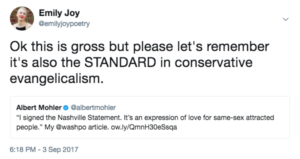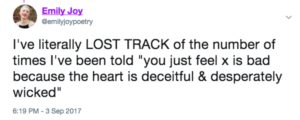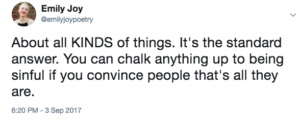I’m sure by now if you’re reading a blog about the Nashville Statement on my website, you’re familiar with what it is — but just in case you’re not, here’s a quick run down. A whole bunch of white men + a tiny handful (think “Trump hands” tiny) of people who are not white men got together and wrote and issued what they purported to be a definitive statement on human sexuality and God’s plan for marriage and sex, which in a move that surprised literally no one, managed cut off LGBTQ persons and anyone who supports them from the Christian family entirely and said not a single solitary word about rape, sexual assault, or consent. Shocked? Don’t be. The signatories have by and large been saying all these things for years — the Nashville Statement just represents a formal codification of their bigotry, but it’s nothing new.
You can read a lot of good and important commentary on the Nashville Statement elsewhere, but the thing I want to focus on in my small space here is a quote from Albert Mohler, who doubled down on his signing of the Nashville Statement in the Washington Post yesterday. The article itself was titled, “I signed the Nashville Statement. It’s an expression of love for same-sex attracted people” — which is sickening enough — but then in it, he claims,
“In releasing the Nashville Statement, we in fact are acting out of love and concern for people who are increasingly confused about what God has clarified in Holy Scripture.”
And here is the deal. I struggle with the Bible and with faith, but I take the words of Jesus seriously when he says that you will know a tree by its fruit. And the fruit of the theology found in the Nashville Statement — the theology that many of us were indoctrinated to believe was the only way to view sex and sexuality that would please God — has been pain and death to the vast majority of people who labor under its heavy yoke. It has been a millstone around the neck of children. 40% of kids experiencing homelessness are LGBTQ and many are experiencing homelessness because of family rejection. Nearly half of all trans people will attempt suicide at some point in their life. Bisexual women have higher rates of depression and suicide than both straight women and lesbians. None of this is because they are secretly depressed that they are rebelling against God, as those whose consciences are seared to the point of being able to sign a document like the Nashville Statement might claim. And beyond the statistics and studies, there are the broken hearts and broken families that we all know: people who have been chewed up and spit out by the unflinching, compassionless evangelical commitment to cisheteropatriarchy and the belief that anything else is anathema. I’m raising my hand here. That’s me too. My life, relationships, and family have all suffered greatly because of the inability to see sex as anything other that “one man, one woman, for life, or else.”
The point is this: there is no such thing as a “good” doctrine that leads to death. There is no such thing as a “good” doctrine that does not lead to more love and more human flourishing. So for Albert Mohler or anyone else to claim that the theology found in the Nashville Statement is an act of love would be laughable if it weren’t so horrifying and tragic. And the reality is that beating someone over the head with a bat over and over again and calling it love is… abuse.
Yes. The Nashville Statement is abusive. By definition.
But what struck me last night as I was thinking about it is that the Nashville Statement is not abusive because it is this uniquely awful thing — a freak mutation in an otherwise innocuous system — but because it follows the modus operandi of conservative evangelicalism to the letter.
Gaslighting is pretty much the base posture of this kind of theology. In order to shore up power and make people fall in line, you have to get them to doubt their experiences of the world and their thoughts and feelings. So you tell them that they can’t be trusted, that their hearts are deceitful and desperately wicked, that if they were really close to God they would see things your way and read the Bible like you do. You tell them if they come up with a different interpretation it’s because their sinful desires are getting in the way, and they should be more objective, like you. That way, when they object to the way you’re treating them and they tell you that it’s not loving, you can tell them that God calls us to speak the truth in love even when it’s not popular, and they need to repent of their selfish ways. You can tell them love wants what’s best for them — and they don’t know what’s best for them because they’re so damn sinful. You can tell them you’re just trying to stop them from going to hell. If fear mongering doesn’t work, you can move on to the isolation phase, where you cut them off from their support system in an effort to smoke them out and get them to come crawling back. And if that doesn’t work, you cut them off entirely, along with anyone who supports them. Make an example out of them. This is what happens when you don’t fall in line.
I’m sorry, was I talking about The Nashville Statement? Oh right.
Ultimately: whatever else the Nashville Statement may be, it is not love. It is abuse. It is death, and privilege, and manipulation, and destruction. Yoke and millstone. But it is those things because it is following in a long lineage of evangelicalism that gaslights, isolates, threatens, and manipulates in order to maintain control. So it is awful, but it is no surprise. The Nashville Statement and its signatories should be criticized for their blatant sexism and homophobia, but this criticism should also be situated as a part of a larger conversation about the rottenness of the core of evangelicalism. We shouldn’t treat the homophobia in the Nashville Statement as a “bad apple” on an otherwise good tree. The tree produced this fruit, and it makes all the sense in the world.





